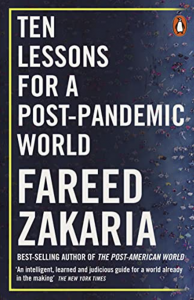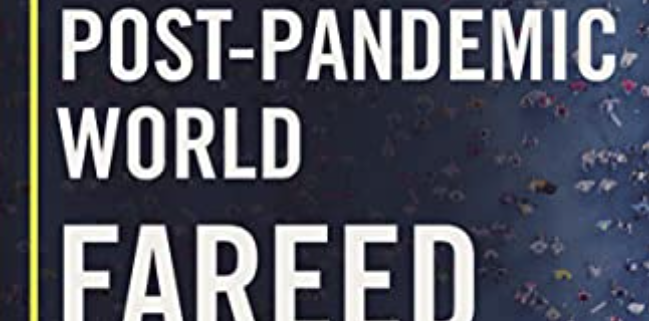Ten lessons for a post-pandemic world

In 2020, the same year as the COVID-19 pandemic, Fareed Zakaria, a well-known CNN journalist and Washington Post columnist, published the book Ten Lessons for a Post-pandemic World. Nothing replaces reading it. Therefore, these lines are only intended to encourage you to do so and enter its pages.
The “bat” effect
In this introduction it is commented that the traditional dangers that we contemplated were related to military attacks and invasions, planning symmetrical responses, which consisted in the construction of a military power.
This is not a book about the pandemic, but about its consequences. The answer has to start from the realization that the world is interconnected, that most countries were not prepared for the pandemic.
Post-pandemic life will be different for many countries, companies, and individuals. Even if economics and politics return to “normal,” human beings will not do the same.
Lesson 1: Buckle Up
The pandemic hit a world whose essential structure was the years after the Cold War, an unstable world, with many tensions.
The forecast of the next pandemic has to start from a balance between security and dynamism.
Lesson 2. What matters is not the size of the government, but the quality
The bottom line is that, given the anti-government tradition of the United States, at this point this country needs to learn from the rest of the world. And the answer is not more government, but better government.
Lesson 3. Markets are not enough
In this sense, the Danish model is mentioned, with a functioning market, but with high rates of taxation and redistribution.
Lesson 4. The people must listen to the experts, and the experts must listen to the people
The reality is that science never gives a single simple answer, especially with new phenomena like the coronavirus. Science is, above all, a method of inquiry. Science is the process of learning and discovery.
In many places, scientists are not listened to, but conclusions are reached for reasons of affiliation (to political parties, due to the city / rural environment, etc.).
To navigate this and other pandemics, the people must listen to the experts and the experts must also listen to the people.
Lesson 5. Life is digital
After the 1920s, people turned to farms, factories and offices because there was no other alternative. To work, you had to be at work. This is not true any more.
COVID-19 came to an already interconnected world.
One of the professions that has changed the most is precisely medicine. Patients no longer need to make long trips to doctors’ offices.
In medicine, people were spending – and are spending – more on treatments than on prevention.
The technology that will change medicine the most is artificial intelligence.
This raises new problems: the scarcity of work – and the consequent need to give our lives a purpose – and the control of artificial intelligence.
Lesson 6. Aristotle was right: we are social animals
Despite the facilities to communicate digitally, cities still make sense.
The post-pandemic city will be born. The new metropolitan model is proposed in Paris, when we speak of the “city of the quarter hour”, in which everything (shops, work, parks, schools, cafes, gyms, doctors’ offices, etc.) is at a maximum of fifteen minutes.
Remote work is a great tool, but an imperfect substitute for human contact.
Lesson 7. Inequality will get worse
The decline in global inequality had occurred, in large part, due to the sustained economic progress of China, India and other developing countries.
With COVID-19 this progress stopped. The pandemic may erode the equity gains of the past 25 years.
Lesson 8. Globalization is not dead
The current anti-globalization movement considers that we are too connected, our lives and economies depend on so many factors, that we have lost control of our own destiny.
If we want to raise the standard of living of populations, we have to find ways to buy and sell with the rest of humanity.
Lesson 9. The world becomes bipolar
When we speak of bipolar, we refer to the United States – which continues to be a great power – and China – which economic growth is turning into the same-.
Tensions between these two great powers are inevitable.
Lesson 10. Sometimes the great realists are the idealists
The restoration of an American order is no longer possible.
The future is multilateral. This approach offers the possibility of solving common problems.
Conclusion: Nothing is written
The changes brought about by the pandemic – online teaching and telemedicine, among others – may be the beginning of a great change or momentary blips.
Countries can change.
Global international collaboration requires some elements of collective decision-making.
This post is also available in: Spanish



